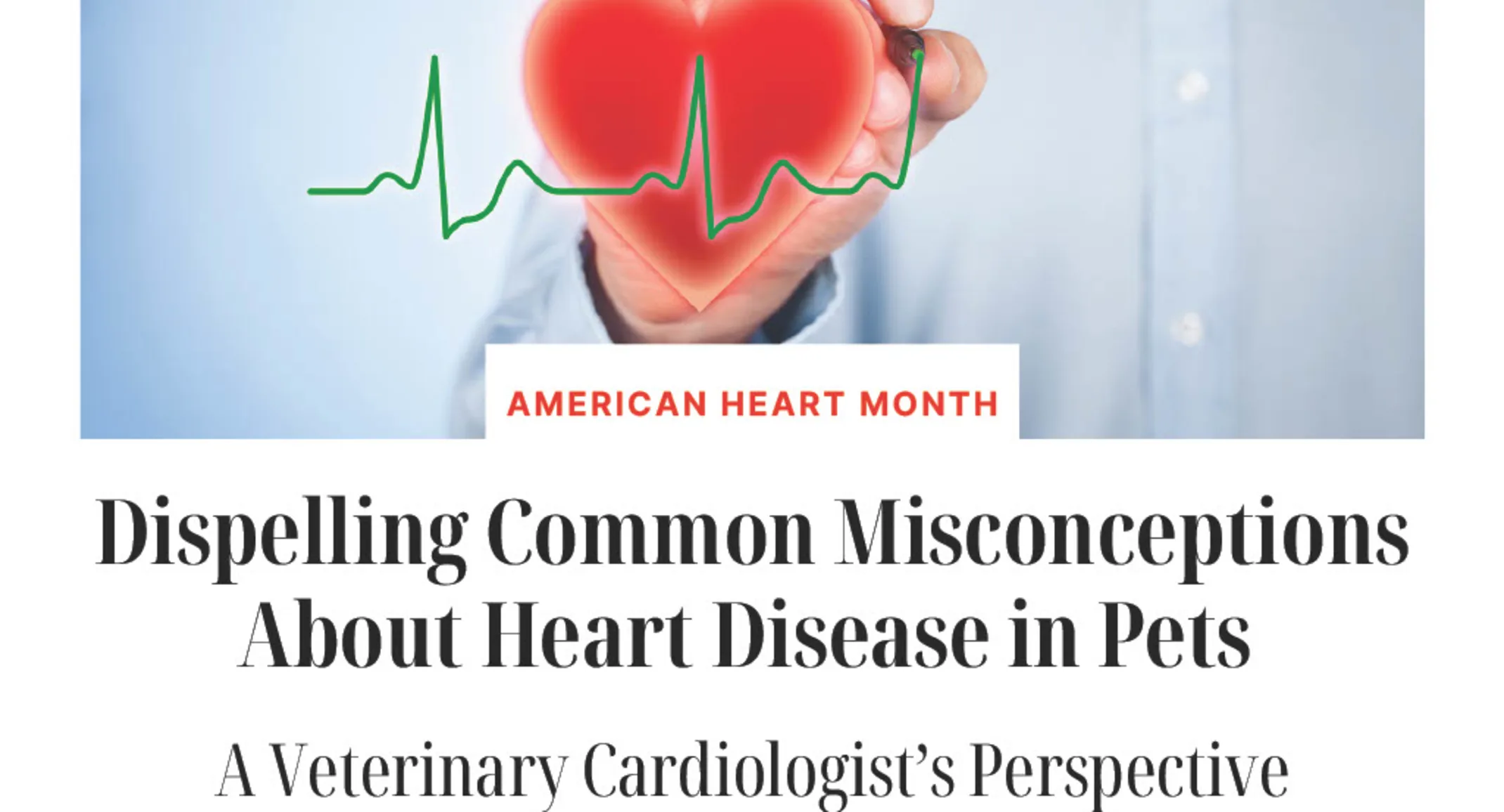Dispelling Common Misconceptions About Heart Disease in Pets: A Veterinary Cardiologist’s Perspective
Caring For Your Pet

February is American Heart Month, a perfect time to raise awareness about heart health – not just for people, but for our beloved pets, too! As a veterinary cardiologist, I often encounter misconceptions about heart disease in pets that can lead to delayed diagnosis and treatment. Let’s set the record straight:
Misconception #1: Heart murmurs in pets are not concerning until symptoms develop.
While some heart conditions have extended symptom-free periods after a heart murmur is recognized, early intervention can significantly improve a pet’s quality and length of life. For example: the symptom-free period for dogs with degenerative mitral valve disease or dilated cardiomyopathy can be extended with medication(s), if started at the appropriate time. Similarly, the grade (loudness) of a heart murmur does not always match the severity of heart disease – so even quiet murmurs should not be ignored. It is best practice to fully investigate ANY heart murmur to determine the best course of action to provide the best possible outcome for a pet. This typically includes evaluation with a veterinary cardiologist.
Misconception #2: Heart murmurs in puppies and kittens are not concerning unless they persist or worsen.
Some murmurs in young pets can be harmless, but many are early indicators of congenital heart defects that require prompt attention. Delayed diagnosis of such diseases can limit treatment options and negatively impact a pet’s prognosis. Some heart defects can even be cured with surgery, if performed before major damage develops. To ensure the best outcome, it is best practice to investigate ALL heart murmurs as early as possible in young pets.
Misconception #3: Heart disease in pets can be prevented by a healthy diet and regular exercise.
Coronary artery disease (CAD) is the most common heart disease in people in the US. This disease is characterized by the accumulation of fat deposits (plaque) within the coronary arteries, effectively blocking blood flow and oxygen delivery to the heart itself. Direct risk factors for CAD in people include high blood cholesterol and high blood pressure, both of which can be reduced by lifestyle choices that include regular exercise and a healthy diet. CAD is RARELY a cause of heart disease in pets, so these same benefits are not seen. Instead, most heart diseases in pets are genetically inherited, meaning that even the healthiest pets can develop heart conditions. This difference also explains why “heart attacks” are uncommon in pets. Pets may faint or have other heart-related episodes that resemble heart attacks, but these do not typically cause lasting damage as heart attacks do in people.
Misconception #4: My pet has never had a heart murmur recognized, so they cannot have heart disease.
Many serious heart conditions in pets do not produce an audible heart murmur. For example, hypertrophic cardiomyopathy (HCM) – the most common heart disease in cats – affects about 1 in 7 cats, yet 70% of cats with HCM do NOT have a detectable murmur. Similarly, 75% of dogs with dilated cardiomyopathy (DCM), do NOT have murmurs; DCM is the most common heart disease diagnosed in large dogs. Because of this, routine screening – especially for breeds predisposed to these conditions (such as Maine Coons, Ragdolls, and Sphynx cats for HCM, or Dobermans and Great Danes for DCM) – is crucial, even when heart murmurs are not present. This is best completed by visiting a veterinarian cardiologist, but initial screening tests can be performed with primary care veterinarians (chest x-rays, NT-proBNP blood tests).
The Importance of Early Detection and Specialist Care
Heart disease in pets can often be managed successfully with early detection and appropriate treatment. If your pet is diagnosed with or suspected of having heart disease, referral to a veterinary cardiologist can make all the difference in their prognosis and quality of life.
So let's guard our hearts from undiagnosed disease this Valentine’s season – because every heartbeat counts! ❤️🐾
Shane Murphy, DVM, DACVIM (Cardiology)
Veterinary Cardiologist
Mission Veterinary Emergency & Specialty
